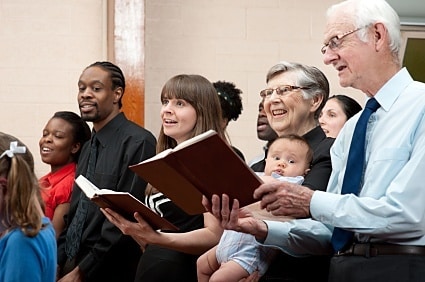January 15, 2014
This is the first in a three-part series about evangelization
Is evangelization inevitability elitist?
This questions comes up in several ways very often when dealing with parishes or organizations. It’s a difficult question to face. And one that can easily be answered incorrectly.
I remember asking one prominent leader in evangelization, a priest, if he thought that his parents were evangelized. He shook his head to indicate “no,” and explained that he did not think his parents were disciples in the sense in which the Church calls Catholics to be disciples today. This rather stunned me. If they weren’t disciples, if generations of Catholics over centuries weren’t disciples, then have we developed a very high, almost exclusive, definition of discipleship?
A few years ago, it was popular to cite some words of Pope Benedict to the effect that the Church had to become smaller, had to shrink, in order for really committed Catholics to show themselves and support each other. This seemed to lead, as I looked at it, to an attitude in which priests were somewhat willing to see Catholics slip away because they weren’t true Catholics in the first place. I remember one bishop bringing this point up to me when I was giving a presentation in his diocese. “What do you say to this?” he asked me. I answered that Pope Benedict has not yet attended one of my seminars!
Pope Benedict was widely quoted as expecting a “smaller” and “purer” church. Any search engine will bring up numerous references to this line of thinking. He did say in 1969, long before he became pope, the following:
“It will become small and will have to start pretty much all over again. It will no longer have use of the structures it built in its years of prosperity. The reduction in the number of faithful will lead to it losing an important part of its social privileges.” It will start off with small groups and movements and a minority that will make faith central to experience again. “It will be a more spiritual Church, and will not claim a political mandate flirting with the Right one minute and the Left the next. It will be poor and will become the Church of the destitute.”
This view refers more to the de facto reality of a Christianity losing its influence than to a deliberately smaller Church because it has excluded the mediocre. Nevertheless, the notions of “smaller” and “purer” remain ever coupled with Pope Benedict’s vision for the Church; any Internet search shows this.
I have also often observed what happens in parishes. Some group of parishioners get “more involved” through one or another process – perhaps the Cursillo movement, a prayer group or some parish program. This group then starts looking at the rest of the parishioners as somehow “doing less” than they should. As this smaller group starts to talk, they infer that the rest of the parishioners – who come to Mass and maybe even serve in one or another ministry – aren’t really committed, or aren’t really evangelized, or aren’t really disciples. Once this starts, you can bet the process of doing evangelization ministry, or renewing the parish, will come to a standstill.
Sherry A. Weddell, in her influential book “Forming Intentional Disciples” (OSV, 2012), says, “In calling Catholics to a deliberate discipleship and intentional faith, our goal is not to create a community of spiritual elites. Rather it is to create a spiritual culture that recognizes, openly talks about, and honors both the inward and outward dimensions of the sacraments and the liturgy (p. 122-3).” This refers to her argument that Catholics receive sacraments externally without the inner transformation and conversion that they imply. “The majority of Catholics in the United States are sacramentalized but not evangelized (p. 46).” On page 186 of the book, Sherry Weddell shows how small she believes conversion and discipleship can be. “If roughly 2 percent of your parishioners are intentional disciples today, why not shoot for 4 percent five years from now? If you think that roughly 5 percent are disciples right now, what could you to help raise that percentage to 10 percent?” In other words, it would take a parish five years to double its number of “intentional disciples”; obviously, intentional discipleship, while offered to the many, is accepted only by the few. By assumption, if it takes five years to double the number of intentional disciples, discipleship is not a mass movement. Just the opposite.
